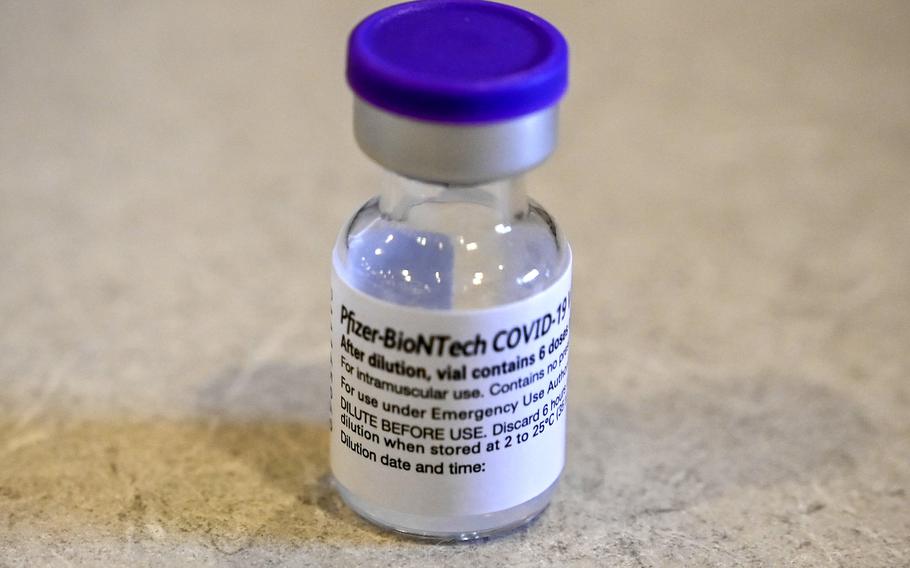
A vial of Pfizer COVID-19 vaccine sits on a table during a vaccination clinic at Bradley Air National Guard Base in Connecticut, April 18, 2021. (Steven Tucker/U.S. Air National Guard )
(Tribune News Service) — As the Kansas National Guard implements the first phase of a COVID-19 vaccine mandate, a group of legislators is raising questions of potential conflict with state law.
Rep. Pat Proctor, R-Leavenworth, sent a legislative inquiry to the Adjutant General of the National Guard on Tuesday. His letter seeks answers on whether the order runs afoul of a law passed last session that bars state funds from being used to enforce a COVID-19 vaccine mandate.
Proctor's question is under what legal authority the vaccines are being mandated.
A spokesperson for Maj. Gen. David Weishaar, the adjutant general, did not immediately respond to a Capital-Journal request for information Tuesday.
The National Guard has apparently already started the first phase of its vaccination requirement, according to a copy of a warning order provided by Proctor. The warning order, dated Sept. 24, indicates the education phase of the vaccine mandate began immediately.
"The Secretary of Defense has directed every service member under the Department of Defense to be fully vaccinated against the COVID-19 virus," the order states.
The mission, according to the order, is for the Kansas Army National Guard to achieve 100% COVID-19 vaccination by June 30. The Guard "deliberately conducts vaccination of uniformed service members in order to protect personnel from the COVID-19 disease."
After President Joe Biden announced vaccine mandate plans last month, the U.S. Army released details on Sept. 14. Army officials said that National Guard members fall under the Department of Defense vaccine mandate, with a deadline of June 30 for guardsmen and guardswomen.
Religious and medical exemptions are available. The only mandatory vaccine is the Pfizer one, which is fully approved by the Food and Drug Administration, though the vaccines with emergency-use authorizations are also acceptable.
The vaccine mandate comes as coronavirus pandemic indicators are descending from a surge fueled by the highly contagious delta variant.
Last month, an Air National Guard service member died from complications caused by COVID-19, according to the governor's office. Michael Baker was the assistant fire chief of the 190th Air Refueling Wing at Forbes Field in Topeka. Baker reportedly contracted the disease while on duty.
"This is quite literally a matter of life and death for our Soldiers, their families and the communities in which we live," said Lt. Gen. R. Scott Dingle, the U.S. Army Surgeon General, in the military's September announcement. "Case counts and deaths continue to be concerning as the Delta variant spreads, which makes protecting the force through mandatory vaccination a health and readiness priority for the total Army."
The federal authority could conflict with SB 159, a budget appropriations law with a section blocking state agencies from using state money to issue or require anyone to use a COVID-19 vaccine passport.
Democratic Gov. Laura Kelly did not use her line-item veto authority on the provision.
A vaccine passport, as defined by the law, includes written or electronic documentation of an individual's vaccination status. The law doesn't prohibit state agencies from "instituting COVID-19 screening protocols in accordance with state and federal law to protect the public health."
"The provisions of this statute, as I understand them, bar you from issuing or requiring proof of Covid-19 vaccination from any of your servicemembers (unless they are activated by the federal government and become subject to the provisions of Title 10 of U.S. Code)," Proctor wrote.
Proctor, a retired Army colonel who is a member of the House Committee on Veterans and Military, noted that the National Guard is subject to state laws except for when it is activated for federal service.
The letter was co-signed by fellow committee members Rep. Ronald Ellis, R-Meriden, and Rep. Timothy Johnson, R-Bonner Springs.
The timeline of the vaccine requirement opens an opportunity for further legislative action. Leadership established a Special Committee on Government Overreach and Impact of COVID-19 Mandates, which is tasked with finding ways to challenge Biden's mandates.
The order states that the education phase will be used to inform all unvaccinated guardsmen and guardswomen about the vaccines, including how to request medical or religious exemptions. The phase ends no later than Dec. 31.
The vaccination phase, focused on inoculating all remaining unvaccinated service members and processing exemption requests, begins Jan. 1 and ends no later than March 31.
The validation phase begins April 1 and ends on June 30. That appears to be when the National Guard could "order initiating involuntary separation actions on those who refuse the vaccine who are not pursuing exemptions."
Soldiers in mobilizing units could be subject to accelerated timelines.
The special committee hasn't scheduled its first meeting.
(c)2021 The Topeka Capital-Journal, Kan.
Visit The Topeka Capital-Journal, Kan. at www.cjonline.com
Distributed by Tribune Content Agency, LLC.